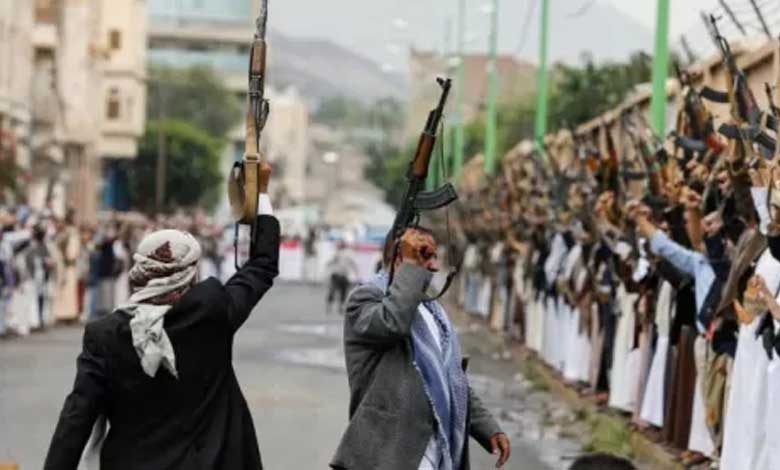“Zakat al-Khums” : Houthi’s weapon to plunder Yemeni funds

Al-Houthi’s militia found it misleading in Ramadan to exhaust the “empty bellies” of Yemenis by increasing the share of “Zakat Al-Fitr”, one of the five pillars of Islam.
The coup militia imposed the racist “Law of the Khums” as a brake on the collection of “Zakat Al-Fitr” to legalize the looting of 20% of each person’s forces in areas under their control in northern Yemen.
A circulating document issued by the so-called “General Authority of Zakat” – a fledgling entity established by the Houthi militia in 2019 – showed that the coup militia had approved the per capita zakat quota in areas under its control of about 550 Yemeni riyals based on the racist Al-Khums law, not Yemeni law.
According to Yemeni law, Zakat is a “detrimental” measure of the people’s strength and allows people to pay the amount in cash if they have an interest in doing so.
Explicit amendments
Al-Houthi’s militia has made blatant amendments to Yemen’s “Zakat” law, using it as a cover to impose a racist slur aimed at turning “Zakat” into another source of supply for its war treasury.
According to the document, the Mufti of the Houthi militia, Shams Eddin Bin Sharafeddine, justified the lifting of Zakat Al-Fitr from one individual as “based on the rise of the price of wheat on the market”, which is one of the flagrant fallacies of the coup.
A simple audit by Al-Ain Al Akhbar showed that the Houthi militia’s zakat collection quota is the same as the racist Law of the Khums by estimating the value of 50 kilograms of wheat, which it claims is 11 thousand Yemeni riyals, divided by 20%, to the equivalent of 550 Yemeni riyals.
What is the Law of the Khums?
“The Khums is decree that started by the Houthi militia on 29 April 2020, to collect and disburse Zakat funds and each individual must pay 20% of his or her wealth each year to the descendants of the coup-takers.”
“With the onset of Ramadan, the Houthi militia began requiring all government offices and private sector institutions under its control to deduct 20% for each worker and employee.”
The coup militia has also intensified its propaganda campaigns and distributed dozens of committees among neighborhoods and villages to count residents in cities and rural areas in order to create a database to determine the extent of the alleged Zakat to be paid to each individual and family.
Al-Ain News learned from sources in Hodeidah that the Houthi militia is using statements related to Zakat payers for purely military purposes, which is strongly criminalized by Yemeni law and carries the harshest penalties.
She added that the Houthi database seeks to know the full savings and properties of families and force them to pay 20% of all property to finance the war fronts, in addition to their aim to exhaust the well-off families, while the poor are recruited under the claim that “self-jihad” is in lieu of money.
Zakat-covering collection
Al-Houthi’s militia has launched large-scale raids on shops and shops in areas under its control, particularly Sanaa, for allegedly paying Zakat, which exploits this Islamic duty to legalize new financial donations.
The owner of a store in Sanaa told Al-Ain News that most shops on Sakhr Street in the kidnapped capital were severely attacked by the coup militia.
He pointed out that the Houthi militia had warned the owners of shops and stores of the necessity to pay the alleged Zakat, which is a fifth of the profits and capital tax.
Al-Houthi’s militia had built a so-called “Public Zakat Authority” on the ruins of Yemen’s Zakat Collection Authority as part of a broader plan to diversify the sources of the war economy and enforce the racist Law of Khums.
Houthi abuses
Houthi violations were widely condemned by businessmen and the Chamber of Commerce and Industry, which is under the control of the coup militia in Sanaa, and denounced Houthi violations through the coup’s Zakat authority.
A statement issued by the Chamber of Commerce and Industry, of which Al-Ain News obtained a copy, said that the Houthi Zakat commission carried out armed patrols, security and intelligence to demand that the private sector hand over a financial database or close their shops.
He said most shop owners paid zakat and are committed to law and order, which caused significant damage because their shops were closed.
The Chamber of Commerce and Industry called on the media, the private sector and the legal profession to attend the press conference scheduled for Monday to expose the arbitrary practices of Houthi militias against the private sector under the cover of collecting “Zakat”.












